Today’s Current Affairs: 19th November 2025 for UPSC IAS exams, State PSC exams, SSC CGL, State SSC, RRB, Railways, Banking Exam & IBPS, etc
Table of Contents
Lycodon irwini:

Researchers recently confirmed the discovery of Lycodon irwini, a glossy black wolf snake, on Great Nicobar Island.
- Lycodon irwini is a new species of snake.
- It was discovered on the remote Great Nicobar Island at the southern tip of the Nicobar Islands.
- The snake, which is a member of the Lycodon subcinctus group, was named in honour of the late Australian conservationist and television personality, Stephen Robert Irwin.
- It is a striking glossy-black wolf snake that had remained unidentified for years because it closely resembles another widespread species.
- The new research finally confirms that the Great Nicobar population represents a distinct species currently known only from the island.
- One of the most notable features of Lycodon irwini is its uniform glossy black colour, unlike close relatives that typically have white bands or patches.
- The snake is slender, nocturnal, and can grow close to 1.2 metres in length.
- The researchers also documented a higher number of belly and tail scales compared to similar species.
Vitamin K:

Vitamin K, often overlooked, is vital for blood clotting, bone strength, and heart healthIt is a fat-soluble vitamin that comes in two forms.
- The main type is called phylloquinone (Vitamin K1), found in green leafy vegetables like collard greens, kale, and spinach.
- The other type, menaquinones (Vitamin K2), are found in some animal foods and fermented foods.
- Menaquinones can also be produced by bacteria in the human body.
- Vitamin K helps to make various proteins that are needed for blood clotting and the building of bones.
- Prothrombin is a vitamin K-dependent protein directly involved with blood clotting.
- Osteocalcin is another protein that requires vitamin K to produce healthy bone tissue.
- Vitamin K is found throughout the body, including the liver, brain, heart, pancreas, and bone.
- It is broken down very quickly and excreted in urine or stool.
- Because of this, it rarely reaches toxic levels in the body even with high intakes, as may sometimes occur with other fat-soluble vitamins.
- Many people fall short of Vitamin K not because food is scarce but because daily diets lack greens and fermented foods.
- Over-frying or overcooking vegetables also destroys much of the vitamin.
- Long-term antibiotic use, liver disease, or fat-absorption disorders can further lower Vitamin K levels since it is fat-soluble and requires dietary fat for absorption.
- Vitamin K deficiency can contribute to significant bleeding, poor bone development, osteoporosis, and increased cardiovascular disease.
Dariya Bahadur Island:
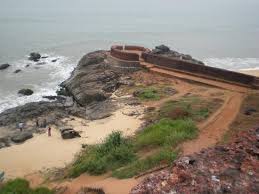
Udupi police recently registered a case against eight individuals who allegedly entered the restricted Dariya Bahadur, or Bhadragada Island, also known as Lighthouse Island, within Malpe police station limits.
- It is located in the Udupi district, Karnataka.
- It is among the four islands near Malpe Beach.
- It is also known as Bhadragada Island, or Lighthouse Island.
- The island’s breadth is just approximately 1.6 square kilometres, and its area is estimated to be less than 250 yards.
- It is well renowned for being a rocky island and esteemed for the elegance of its buildings.
- This island is where the famous Daira Bahadurgarh fort is located.
- It was constructed by Basavappa Naik of Bidanur.
- There is also a mystery associated with the island fort, as the treasure of the king was buried somewhere to escape from the invasion of Haider Ali during the mid-18th century.
- Surrounding the fort premises, there is an old tile factory and also a few temples.
National Gopal Ratna Awards 2025:
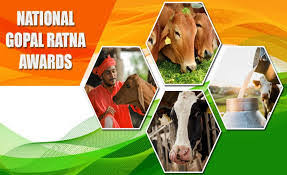
The Department of Animal Husbandry and Dairying recently announced the winners of the National Gopal Ratna Awards (NGRA) 2025.
- NGRA are the country’s highest honours in the livestock and dairy sector.
- It was constituted by the Department of Animal Husbandry, and Dairying under the Ministry of Fisheries, Animal Husbandry and Dairying.
- It was launched under the Rashtriya Gokul Mission in 2021.
- It aims to encourage excellence among milk-producing farmers, dairy cooperatives, Milk Producer Companies (MPCs), Dairy Farmer Producer Organizations (FPOs), and Artificial Insemination Technicians (AITs).
- The NGRA will be conferred in the following categories:
- Best Dairy farmer rearing indigenous cattle/buffalo breeds (list of registered breeds Annexed).
- Best Dairy Cooperative Society (DCS)/ Milk Producer Company (MPC)/Dairy Farmer Producer Organization (FPO).
- Best Artificial Insemination Technician (AIT).
- There is also a provision of Special award for the North Eastern Region (NER) and Himalayan States so as to encourage and boost the dairy development activities in these States/UTs.
- The Award consists of a cash prize of 5 lakh for 1st rank, Rs. 3 lakh for 2nd rank, Rs. 2 lakh for 3rd rank and Rs. 2 lakh for Special Award for North Eastern Region, along with a Certificate of merit and a memento in the first two categories i.e Best Dairy Farmer and Best DCS/FPO/MPCs.
- In the Best Artificial Insemination Technician (AIT) category, NGA will consist of a Certificate of merit and a memento.
Integrated Forum on Climate Change and Trade : COP30
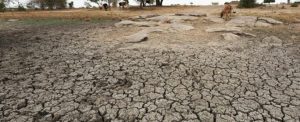
The 30th Conference of the Parties (COP30) to the United Nations Framework Convention on Climate Change formally launched an integrated forum on Climate Change and Trade (IFCCT).
- It is a politically supported forum where countries can address the increasingly contentious intersection between trade policies and climate action
- It was launched at COP30, Belem (Brazil), on 15 November 2025.
- It bridges divides between climate ambition and trade policy and could help developing countries gain a stronger voice in shaping emerging trade rules.
- It will be co-chaired by Brazil and a developed country partner, and open to all Parties to the UNFCCC.
- The IFCCT will be institutionally independent of both the WTO and the UNFCCC.
- The Forum will not negotiate binding outcomes or interpret existing agreements or adjudicate disputes or evaluate specific national measures
- It will begin with an open-ended consultation process extending into 2026 to define what topics to be discussed and forum’s jurisdiction.
- It creates an opportunity of interoperability rather than fragmentation related to climate negotiations.
- It will bring together civil society organisations, business associations, and international initiatives.
Sentinel-6B Satellite:
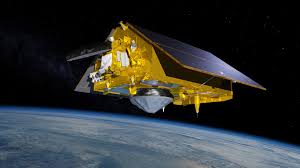
The Sentinel-6B was launched from the Vandenberg Space Force Base in California.
- It is a joint mission between the United States’ NASA and NOAA, and the European Space Agency.
- It is an ocean-tracking satellite which will measure the rising sea levels and its impacts on the planet.
- Sentinel-6B is set to carry forward the legacy of Sentinel 6 Michael Freilich, launched in November 2020.
- It will orbit Earth at a speed of 7.2 km per second, completing one revolution every 112 minutes.
- Sentinel-6B will provide primary sea level measurements down to approximately an inch from over 90% of all the oceans.
- It is expected to spend the next 5.5 years in orbit.
- Components of Sentinel-6B Satellite:
- It consists of six onboard science instruments.
- The satellite has two fixed solar arrays, plus two deployable solar panels, and will travel in a longitude direction around Earth in a non-Sun-synchronous orbit.
- It observe Earth’s ocean, measuring sea levels to improve weather forecasts and flood predictions.
- It safeguards public safety, benefit commercial industry, and protects coastal infrastructure.
Exercise AJEYA WARRIOR-25:
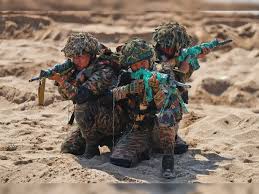
The eighth edition of the Exercise “AJEYA WARRIOR-25” commenced at the Foreign Training Node, Mahajan Field Firing Ranges, Rajasthan.
- It is a bilateral military exercise conducted between India-UK.
- It is held biennially since 2011 which has evolved into a flagship engagement between the Indian Army and the British Army.
- The Indian Army is being represented by troops of the Sikh Regiment.
- Objective is to facilitate the exchange of best combat skills and experiences between the two armies and to enhance their ability to operate together in complex situations.
- It is conducted under a United Nations mandate, the exercise focuses on counter-terrorism operations in semi-urban environment.
- It include joint mission planning at Brigade level, integrated tactical drills, simulation-based scenarios and company-level field training exercises replicating real-life counter-terror contingencies.
- The exercise also aims to share best practices, enhance tactical proficiency and develop coordinated responses for managing complex operations in challenging environments.
- The 2025 edition further reinforces shared values of professionalism, cooperation and commitment to regional stability and global peace.
Regulating Cryptocurrency in India:

A global investigation, titled The Coin Laundry, conducted by the International Consortium of Investigative Journalists (ICIJ), has uncovered how cryptocurrency exchanges have become a new hotspot for global money laundering.
- Cryptocurrencies are borderless, pseudonymous, and fast, offering limited traceability in the absence of strict KYC norms.
- Crypto “mixers” and “wallet hops” obscure ownership trails, making them ideal for laundering illicit proceeds.
- They may also use mule or pooled accounts to deposit cash and buy crypto like Bitcoin, taking advantage of the system’s pseudo-anonymity.
- In this stage, criminals hide the origin of funds by using multiple exchanges, privacy coins, KYC-free Decentralised Exchanges (DEXs), and chain-hopping ( moving cryptocurrency across multiple blockchains in quick succession).
- These tactics break the audit trail, making transactions very hard to trace.
- Actors involved include ransomware groups, drug syndicates, cyber fraud rings, and sanction evaders.
- In the final stage, the “cleaned” funds are converted back into fiat currency and moved into the legitimate economy.
- The criminal sells the obscured crypto on a laxly regulated foreign exchange and withdraws the fiat to a bank account, posing it as legitimate investment returns.
Floating Rate Bonds (FRBs):
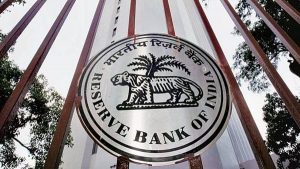
RBI’s Floating Rate Bonds (FRBs) are witnessing a sharp rise in demand as investors shift from equities, gold, and traditional deposits toward safer, higher-yielding government-backed debt instruments.
- The demand is due to their higher returns, which are linked to the National Savings Certificate (NSC) rate + 35 basis points.
- RBI’s Floating Rate Bonds (FRBs) First issued in 1995 in India, RBI’s FRBs are government securities with a variable coupon rate instead of a fixed one.
- The rate is reset at pre-announced intervals (typically every 6 months or 1 year) based on a pre-selected benchmark, distinguishing them from traditional fixed-rate bonds.
- The bonds are open to individuals (including joint holders) and Hindu Undivided Families (HUFs).
- Non-Resident Indians (NRIs) are not eligible to invest in these bonds.
- The interest rate on FRBs is tied to a market-based benchmark, typically the average yield of the last three auctions of 182-day Treasury Bills or a base rate plus a fixed spread decided through auction.
- In some cases, such as RBI’s retail FRBs, the coupon is linked to the NSC rate, making the returns adjust automatically with changes in broader interest rates.
- FRBs protects investors from interest-rate risk—when rates rise, coupon payment also rises.
- It serves as a diversification and hedging tool for portfolios dominated by fixed-rate debt instruments
10th Anniversary of Amrit Pharmacies:
The Union Minister of Health and Family Welfare (MoHFW) inaugurated AMRIT (Affordable Medicines and Reliable Implants for Treatment) Pharmacy’s 10th Anniversary Celebrations at Bharat Mandapam in New Delhi. AMRIT was launched in 2015 by the MoHFW and implemented by HLL Lifecare Limited, a Mini Ratna Public Sector Enterprise under the MoHFW, to reduce out-of-pocket medical costs through a nationwide network of low-cost pharmacy stores. These outlets supply essential medicines, implants, and surgical items at affordable prices to improve access for all patients. It is similar to Pradhan Mantri Bhartiya Janaushadhi Kendras (PMBJK), as both aim to provide medicines and medical supplies at affordable rates. AMRIT’s core aim is to deliver affordable and dependable pharmacy services through the public sector, supporting wider access to essential medicines and reducing treatment costs. AMRIT has supplied medicines worth Rs 17,047 crores and helped patients save Rs 8,395 crore. A total of 68.51 million patients have benefited from the discounted services.
Birth Anniversary of Batukeshwar Dutt:
Batukeshwar Dutt, a brave revolutionary who fought alongside Bhagat Singh in India’s freedom struggle, was remembered on his birth anniversary on 18th November.Batukeshwar Dutt was a freedom fighter and was born on 18th November 1910 in Khandaghosh village, Burdwan district, West Bengal.
During college, he met Bhagat Singh, who inspired him to join the Hindustan Socialist Republican Association (HSRA), and he also became an active member of the Naujawan Bharat Sabha.On 8th April 1929, Dutt and Bhagat Singh threw two homemade bombs into the empty space of the Central Legislative Assembly to protest repressive colonial bills, not to harm anyone.They raised slogans like Inquilab Zindabad, distributed leaflets stating if the deaf are to hear, the sound has to be very loud, and surrendered willingly to draw nationwide attention. Dutt was arrested and given a life sentence. He actively fought for prisoners’ rights and joined several hunger strikes, including a 114-day strike with Bhagat Singh, demanding improved conditions for political prisoners. After his release in 1938, Dutt joined the Quit India Movement (1942). He is remembered as a selfless revolutionary, embodying Swami Vivekananda’s ideal of working without seeking any return. He was cremated at Hussainiwala where Bhagat Singh, Rajguru, and Sukhdev were laid to rest.
Quantum Clock:
A 2025 study in Physical Review Letters has uncovered that in a quantum clock, the energy required to read the time is far greater than the energy required to make the clock tick, offering new perspectives in quantum physics, thermodynamics, and precision metrology.A quantum clock measures time using the behaviour of quantum particles, whose states change in tiny and probabilistic ways.Unlike classical clocks that always tick forward, quantum clocks show randomness, generate very little entropy (heat or disorder created when energy is used), and can even tick backward — raising the challenge of how they create a reliable and irreversible sense of time.A quantum clock operates using a Double Quantum Dot (DQD) system, consisting of two tiny electron-holding “islands” in a semiconductor.A single electron moves through them in the sequence 0 → L → R → 0, and this full cycle counts as one clock tick.The electron’s movement is controlled by voltages, and when forward and backward jumps become equal (equilibrium), no entropy is produced, and the device stops functioning as a clock.To read the time, a nearby quantum dot acts as a charge sensor, and its current changes depending on whether the electron is in state 0, L, or R.Measuring the electron’s state uses energy, which creates a small amount of heat or disorder (entropy).
India Joins Global Research on Dolphin–Fisher Mutualism:
The University of Kerala, in collaboration with international researchers, has launched a multi-year research project (2024–2028) to study the rare cooperative fishing behaviour (mutualism) between Indo-Pacific humpback dolphins and artisanal fishers in Ashtamudi Lake, Kerala.Indo-Pacific humpback dolphins (Sousa plumbea) signal dense fish shoals with tail-slaps or rolls, helping fishers cast nets at the right moment for maximum yield, while the scattered fish become easier for dolphins to catch.It is a long-term association between two species where both benefit—such as through food, protection, pollination, seed dispersal, or shelter.They are known for their distinct hump and elongated dorsal fin, inhabit shallow coastal waters across Australia, Africa, and Asia.The group comprises four species, with S. teuszii—and S. chinensis—listed under Appendix I and II of the Convention on the Conservation of Migratory Species of Wild Animals (CMS).It is listed as Endangered by IUCN.
India Africa Bilateral Relations:
India’s renewed diplomatic push towards Africa has triggered debate after experts highlighted the need to “connect, build and revive” India–Africa ties ahead of the next India–Africa Forum Summit (IAFS-IV).Centuries-old Indian Ocean trade in gold, spices and textiles built deep sociocultural links, reinforced by Gujarati merchant networks and shared experiences of colonial exploitation. India championed African liberation movements through NAM, supported anti-apartheid struggles, and coordinated decolonisation diplomacy at the UN throughout the Cold War. Economic reforms shifted India’s Africa policy toward investments, ITEC-driven capacity building, and joint positions in WTO, climate negotiations and UN Security Council reform efforts. IAFS-III united all 54 African nations; India opened 17 new embassies, scaled digital and development partnerships, and secured AU’s permanent membership in the G20 in 2023.
Chatbot Initiative for Animal Healthcare:
Rajasthan’s Animal Husbandry Department has launched a pioneering chatbot-based veterinary service that enables livestock owners to report illnesses and receive expert medical guidance digitally.A digital, chatbot-enabled veterinary assistance platform through which livestock owners can report symptoms and receive real-time medical advice from certified veterinary doctors.Aim is to provide fast, accessible, doorstep veterinary care for livestock farmers,to reduce animal mortality through timely diagnosis, consultation and intervention.
Rudra Brigade:
The Army successfully validated a newly raised Rudra all-arms integrated brigade during the major tri-service Trishul exercise, prompting discussions on upgrading India’s Cold Start doctrine to a “Cold Strike” doctrine.A Rudra Brigade is a newly conceptualised all-arms, permanently integrated combat formation combining infantry, mechanised units, armour, artillery, air defence, engineers, signals, drones, logistics and support elements under a single operational framework. Operated by the Indian Army, under different regional Corps (e.g., Konark Corps on western front). Two Rudra brigades already deployed on the northern borders (Eastern Ladakh & Sikkim).
India’s first-ever major LPG import deal with the US:
India has finalised its first-ever structured LPG import deal with the US, sourcing 2.2 MTPA—about 10% of annual LPG imports—for 2026. A one-year structured contract under which Indian PSU refiners will import 2 million tonnes per annum (MTPA) of LPG from the US Gulf Coast in 2026—India’s first formal long-term LPG sourcing contract from the US.
Nations Involved:
- India: IOC, BPCL, HPCL
- United States: US Gulf Coast producers (Chevron, Phillips 66, TotalEnergies Trading)
Global Big Cats Summit:
India announced that it will host the Global Big Cats Summit in New Delhi in 2026, reaffirming global leadership in wildlife conservation. A high-level international summit dedicated to strengthening global cooperation, policy coordination, and scientific collaboration for the conservation of big cat species across continents. Host: India, in New Delhi.Brings together big-cat range countries, global experts, scientists, conservation NGOs, and policy leaders.Focus on tiger recovery models, lion conservation, snow leopard landscapes, cheetah translocation lessons, and global best practices. Strengthens global partnerships to protect big-cat habitats that support carbon sequestration, watershed protection, climate resilience, and sustainable livelihoods.




